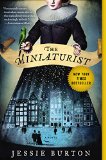Summary | Excerpt | Reading Guide | Reviews | Beyond the Book | Readalikes | Genres & Themes | Author Bio

Mid-October 1686
The Herengracht canal, Amsterdam
Outside In
On the step of her new husband's house, Nella Oortman lifts and drops the dolphin knocker, embarrassed by the thud. No one comes, though she is expected. The time was prearranged and letters written, her mother's paper so thin compared with Brandt's expensive vellum. No, she thinks, this is not the best of greetings, given the blink of a marriage ceremony the month before—no garlands, no betrothal cup, no wedding bed. Nella places her small trunk and birdcage on the step. She knows she'll have to embellish this later for home, when she's found a way upstairs, a room, a desk.
Nella turns to the canal as bargemen's laughter rises up the opposite brickwork. A puny lad has skittled into a woman and her basket of fish, and a half-dead herring slithers down the wide front of the seller's skirt. The harsh cry of her country voice runs under Nella's skin. "Idiot! Idiot!" the woman yells. The boy is blind, and he grabs in the dirt for the escaped herring as if it's a silver charm, his fingers quick, not afraid to feel around. He scoops it, cackling, running up the path with his catch, his free arm out and ready.
Nella cheers silently and stays to face this rare October warmth, to take it while she can. This part of the Herengracht is known as the Golden Bend, but today the wide stretch is brown and workaday. Looming above the sludge-colored canal, the houses are a phenomenon. Admiring their own symmetry on the water, they are stately and beautiful, jewels set within the city's pride. Above their rooftops Nature is doing her best to keep up, and the clouds in colors of saffron and apricot echo the spoils of the glorious republic.
Nella turns back to the door, now slightly ajar. Was it like this before? She cannot be sure. She pushes on it, peering into the void as cool air rises from the marble. "Johannes Brandt?" she calls—loud, a little panicked. Is this a game? she thinks. I'll be standing here come January. Peebo, her parakeet, thrills the tips of his feathers against the cage bars, his faint cheep falling on the marble. Even the now-quiet canal behind them seems to hold its breath.
Nella is sure of one thing as she looks deeper into the shadows. She's being watched. Come on, Nella Elisabeth, she tells herself, stepping over the threshold. Will her new husband embrace her, kiss her or shake her hand like it's just business? He didn't do any of those things at the ceremony, surrounded by her small family and not a single member of his.
To show that country girls have manners too, she bends down and removes her shoes—dainty, leather, of course her best—although what their point has been she can't now say. Dignity, her mother said, but dignity is so uncomfortable. She slaps the shoes down, hoping the noise will arouse somebody, or maybe scare them off. Her mother calls her overimaginative, Nella-in-the-Clouds. The inert shoes lie in anticlimax and Nella simply feels a fool.
Outside, two women call to each other. Nella turns, but through the open door she sees only the back of one woman, capless, golden-headed and tall, striding away toward the last of the sun. Nella's own hair has loosened on the journey from Assendelft, the light breeze letting wisps escape. To tuck them away will make her more nervous than she can bear to seem, so she leaves them tickling her face.
"Are we to have a menagerie?"
The voice sails sure and swift from the darkness of the hall. Nella's skin contracts, for being right about her suspicions can't banish the goose bumps. She watches as a figure glides from the shadows, a hand outstretched—in protest or in greeting, it is hard to tell. It is a woman, straight and slim and dressed in deepest black, the cap on her head starched and pressed to white perfection. Not a wisp of her hair escapes, and she brings with her the vaguest, strangest scent of nutmeg. Her eyes are gray, her mouth is solemn. How long has she been there, watching? Peebo chirrups at the intervention.
From The Miniaturist by Jessie Burton. Copyright 2014 Jessie Burton. Excerpted by permission of Ecco, an imprint of HarperCollins Publishers.




Nearly all men can stand adversity, but if you want to test a man's character, give him power.
Click Here to find out who said this, as well as discovering other famous literary quotes!
Your guide toexceptional books
BookBrowse seeks out and recommends the best in contemporary fiction and nonfiction—books that not only engage and entertain but also deepen our understanding of ourselves and the world around us.